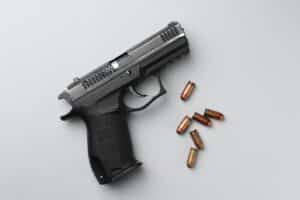
Yes, firearms can cause traumatic brain injuries and leave shooting victims fighting for their lives, not to mention cause lifelong medical issues. Because a bullet can penetrate and damage so many areas of the brain, there is no way to predict the impairments someone might suffer if they survive a gunshot wound to the head.
According to the American Association of Neurological Surgeons, gunshots cause about 12 percent of all traumatic brain injuries (TBIs) in the United States. They are a top cause of brain injuries among people between the ages of 25 and 34.
Types of TBIs Caused by Firearms
In general, there are two types of TBIs caused by firearms: penetrating or perforating. A penetrating injury occurs when the bullet enters the skull but does not exit. This means the bullet is lodged in the brain. In a perforating injury, the bullet passes through the skull completely. The victim will have both entry and exit wounds, and the bullet may have passed through several structures within the brain.
It is also important to note that a gunshot wound can cause a secondary traumatic brain injury by causing bleeding and swelling in the brain in the hours and days following the shooting. Doctors in the emergency department and hospital should take action to try to mitigate the damage this can cause.
Brain Injuries From Firearms Can Affect All Aspects of the Victim’s Life
Each TBI is different, and the lasting effects and the possible recovery from a brain injury differ as well. A number of factors play a role in how much a gunshot wound to the head will affect the victim’s life, including:
- The size and speed of the bullet
- Where the bullet entered
- The trajectory of the bullet
- Whether it affected the left hemisphere of the brain, the right hemisphere, or both
An injury to either side of the brain, depending on where it occurs, can cause impairments related to:
- Memory
- Speech
- Cognition
- Vision
- Mobility
The best way to understand the possible lasting effects of a TBI is to discuss your injuries with your doctors and therapists. Since each gunshot wound and each victim is unique, only experts familiar with your case can accurately assess your injuries and their long-term effects.
Treatment of Traumatic Brain Injury Caused by a Firearm
Often, those with gunshot wounds to the head require aggressive efforts to save their life. Many die before ever reaching the hospital, and others pass away in the emergency room. Those who survive usually require several weeks of inpatient care in the hospital followed by extensive brain injury treatment and rehabilitation.
When a gunshot wound victim arrives at the hospital, the medical team stabilizes them and then conducts imaging scans to understand the areas of the brain affected by the bullet and to check for swelling and bleeding. Surgery may be necessary to limit the swelling or bleeding in order to prevent further injury.
Once they recover enough to begin rehabilitation, victims often transfer to an inpatient rehabilitation facility where they complete therapy to rebuild physical strength, relearn skills, and regain independence.
Recovering From a Traumatic Brain Injury Caused by a Gun
Not only does a firearm-related TBI require costly treatment, the victim may miss months of work or may not be able to return to work at all. Life is often never the same.
Even so-called moderate brain injuries can take a long time to recover from. Those with the most severe brain injuries may require around-the-clock nursing care for the rest of their lives.
If a firearm caused your traumatic brain injury, you qualify for a free case review with a member of the Newsome | Melton team. For more than 20 years, our brain injury lawyers have fought for the rights of personal injury accident victims, including gunshot victims. When you talk to a member of our team, we will:
- Explain your legal options for recovering compensation
- Evaluate the viability of a personal injury case based on what happened to you
- Tell you more about your rights as the victim of a personal injury incident
Call Newsome | Melton for a free review of your case today: (800) 917-5888.
